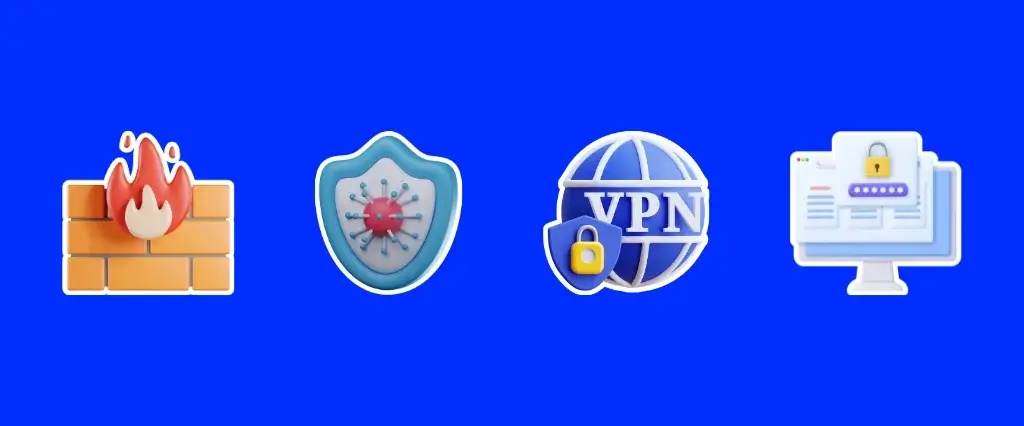Why is cybersecurity important for businesses?
Today, cybersecurity has become a critical aspect for any entrepreneur operating online. As technology advances and businesses increasingly rely on digital platforms and online data, protecting sensitive information and saving technology infrastructure becomes crucial to the success, continuity, but most importantly the image of any business. Below, we explore the importance of cybersecurity for entrepreneurs and how they can protect their businesses from cyber threats. In addition, we will review best practices and tools to protect your online business against cyber-attacks.
Why is cybersecurity important for entrepreneurs?
For many, cybersecurity is simply a matter of installing an antivirus and setting up some passwords. However, it is much more than that, it is a series of practices that will help your business protect itself from hacker attacks and keep business and customer data completely secure. Here are some reasons why you should start worrying about the cybersecurity of your business.

1. Protecting sensitive data
Entrepreneurs often handle a large amount of data that is confidential, such as customer financial information, credit card data, personal information and business records. Cybersecurity helps protect this data from unauthorized access, hacker attacks and identity theft, which can have serious legal and financial consequences for a business if a data breach occurs.
2. Business continuity
Cyber attacks, such as ransomware and denial of service (DDoS) attacks, can disrupt business operations and cause costly downtime. Implementing appropriate cybersecurity measures, such as regular backups, disaster recovery systems and malware protection solutions, helps ensure business continuity and minimize the impact of cyber attacks on productivity and profitability.
3. Protecting brand reputation
A successful data breach or cyber attack can severely damage a brand’s reputation and customer trust. Entrepreneurs who fail to adequately protect the security of their systems and data risk losing the trust of their customers and suffering irreparable damage to their reputation and credibility in the marketplace.
4. Legal and regulatory compliance
Many industries are subject to strict data protection and cybersecurity regulations, such as the General Data Protection Regulation (GDPR) in the European Union or the California Consumer Privacy Protection Act (CCPA) or the Personal Data Protection Act in our country, which states that entrepreneurs must comply with these regulations to avoid legal penalties and fines for data breaches, making cybersecurity a critical compliance priority.
5. Protecting intellectual property
Entrepreneurs often own valuable intellectual property, such as patents, designs, trade secrets, and research and development data. Therefore, proper cybersecurity practices help protect this intellectual property against theft, piracy and copyright infringement, thereby safeguarding the competitive advantage and commercial value of the business.
6. Preparing for the future
As the cyber threat landscape evolves and attacks become more sophisticated, entrepreneurs must be prepared to meet new cybersecurity challenges. Investing in cybersecurity solutions and training staff in secure online practices are essential to stay one step ahead of emerging threats and protect the business for the long term.
Practices to improve your business cybersecurity
Protecting your online business against cyber-attacks goes beyond installing antivirus, in fact cybersecurity depends largely on our behavior on the Internet, so training staff in safe practices to avoid cyber-attacks on the Internet is crucial today. So, here are some of the best practices and tools to keep your business secure.
Keep your systems up to date: make sure to periodically install software updates and security patches on all your systems and devices to protect them against known vulnerabilities.
Use strong passwords: use strong and unique passwords for all your accounts and systems. Consider using a password manager to generate and store passwords securely.
Implement two-factor authentication (2FA): enable two-factor authentication whenever possible to add an additional layer of security to your online accounts.
Back up regularly: back up your data on a regular basis and store it in a secure, offline location. This will help you recover information in the event of a cyber-attack or data loss.
Educate your staff: train your employees on cybersecurity best practices, such as identifying phishing emails and secure use of passwords and devices.
Implement security policies: Establish clear cybersecurity policies and have all employees follow them rigorously. This may include restrictions on accessing certain websites and downloading files.
Monitor and analyze activity: use security monitoring tools to monitor activity on your network and detect any suspicious behavior or malicious activity.

Security tools that you need in your enterprise
Another crucial factor for the cybersecurity of your business is the security tools that will help you detect and prevent threats to your equipment. Here are the tools that you absolutely need in your business:
Firewalls: Network and application firewalls can help block unauthorized traffic and protect your network against intrusions.
Antivirus/antimalware: Using specialized and up-to-date business antivirus and antimalware software will help protect your systems against viruses, malware and other cyber threats.
VPN (Virtual Private Network): a VPN encrypts your internet traffic and allows you to browse securely and anonymously, especially when using public Wi-Fi networks.
Password managers: tools such as LastPass, 1Password and Dashlane help you generate and store passwords securely.
Security monitoring tools: Solutions such as Security Information and Event Management (SIEM) and Security Operations Center (SOC) can help you actively monitor and manage your network security.
Phishing protection: Phishing protection tools such as Proofpoint and Barracuda can help detect and block phishing emails before they reach your employees’ inboxes.
Vulnerability management software: using vulnerability management software such as Nessus and Qualys helps you identify and remediate security vulnerabilities in your network and systems.
In summary, cybersecurity is a critical concern for entrepreneurs, especially today when our venture is so dependent on cloud storage and connectivity. By implementing best practices and using these security tools, you can help protect your online business from cyber-attacks and maintain the security and integrity of your data and systems. Tell us, how do you provide cybersecurity for your business?

